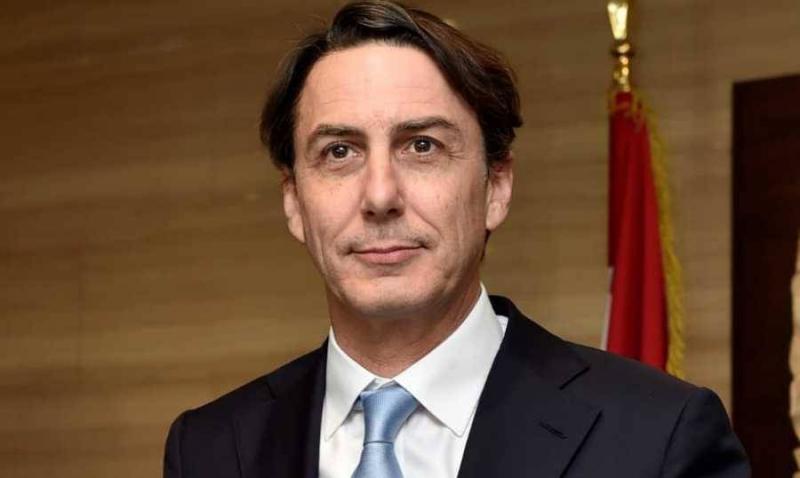The opposition took a long time to realize, absorb, and act on the fact that France is no longer the nurturing mother for the Maronites or Lebanon. This delay in rising against the French policy that supports Iranian interests in the region and "Hezbollah" in Lebanon was based on nostalgia, as some opposition forces clung to the wooden French rhetoric about supporting the state and the special relationship with Lebanon. And now, the opposition is also slow to deal with Washington's orientations, as it seeks a meeting with Amos Hochstein to convey its known position after being ignored by the US envoy. Is this enough, or does it require an uprising against him with a new proposal to resolve the presidential and general crisis?
Was it appropriate for the Lebanese opposition factions to seek a meeting with Hochstein, who has been ignoring them and engaging extensively with President Nabih Berri, granting him superlative titles while overlooking the opponents on the basis that negotiations occur with the powerful, and that Hezbollah and its axis are the decision-makers? Therefore, its opponents do not deserve attention. This logic prevails today by practice.
Previously, the French envoy Jean-Yves Le Drian practiced exclusion and marginalization of Hezbollah's opponents, even excluding the Sunni component from his communications. An uprising occurred against him and the French policy, led by the head of the Lebanese Forces Party, Dr. Samir Geagea, who spoke about the dangers of this policy and reminded France of its own principles toward Lebanon, declaring his refusal to support the party's candidate, former MP Sleiman Frangieh. The French attempted to adjust their movement, yet the substance did not change.
Hochstein's approach differs from the French policy in that he represents the world's foremost superpower and relies on the achievement of maritime border demarcation with Hezbollah on behalf of the Lebanese state. However, he was also clear in his rush to entrench a policy of fait accompli, based on one consideration: the acknowledgment that Hezbollah is the controlling party in Lebanon that deserves to negotiate, not only to resolve the clashes at the border with the occupied territories but also to discuss Lebanon's fate within its political system and its regional status as part of the broader deal with Iran.
Hochstein practices the dialogue that President Berri requests, and he almost dresses in the attire of the Amal movement, just as Le Drian donned the garb of the Iranian Revolutionary Guard. The quintet committee has practically become inactive, as Iran was not invited to it, yet it is simultaneously accommodated as if it were present at the meeting. When Hochstein meets with the axis, does he consider the opposition and its vision of the crisis, and does he pay attention to its opinion as the quintet does to Iran's?
The opposition has nothing to lose with the previous U.S. administration in its deals with Iran, which has driven Saudi Arabia to cut off U.S. extortion in the Yemeni file and the region, leading to a historic reconciliation with Iran. The result has been a cessation of exhaustion in Yemen and the beginning of limited openings in relations between the two countries and within the region. However, this did not extend its implications to Lebanon, either because Tehran and Riyadh do not prioritize it now or due to the incapacity of its political forces to comprehend the dimensions of this reconciliation and find an appropriate exit, or both.
Should the opposition consider a more evolved settlement in light of U.S. disinterest in it, and the approaching Saudi-Iranian rapprochement, and its ability to prevent the success of Hezbollah's presidential candidate to impose a reasonable balance against Hezbollah?
Undoubtedly, some forces in the opposition maintain developmental or political collaboration with U.S. entities, but the significance of these relations is diminishing as events unfold. This is evident in the declining capability and effectiveness of the Lebanese forces facing a lack of international and Arab political support; they currently lack the ability to initiate, and their highest achievement has been a convergence with the Free Patriotic Movement over the name Jihad Azour.
What the opposition realizes but prefers not to discuss is that Saudi Arabia has ended the policy of alignments in the region, including Lebanon, which weakens, in form, the position of the party's opponents. However, there is another aspect that the opposition has not considered: how Iran deals with Hezbollah in the context of this reconciliation with Saudi Arabia in the Lebanese reality. This matter may take time to manifest if left unchanged, but it should be raised and discussed regarding its elements for Arab and Lebanese applicability instead of waiting for a courtesy meeting with Hochstein.
Can another option be contemplated instead of remaining within the framework of clashes against Hezbollah? This conflict has known boundaries, culminating in threats of divorce from some and calls for changing the political system due to the inability to continue under Hezbollah's dominance in Lebanon, which requires a complex internal and external process.
There are those who believe that the opposition should rise against Hochstein and his administration, just as it previously did against Le Drian and his administration, to highlight its strengths as it should be seen by the decision-making capitals. The continuation of this political performance will lead to the erosion of the opposition's strength as regional events unfold, especially since Hezbollah has regional dimensions, while the opposition is confined to its Lebanese framework. This is a positive element; however, the U.S. administration currently sees only the opposite side.
How can a new path be created that compels the quintet capitals to recognize that adhering to the opposition's viewpoint is essential and cannot be overlooked within the frameworks built on understanding Saudi orientations and their progress in engaging with Iran and benefiting from Saudi consistency on presidential specifications, commitment to state-building and reform, and upholding legitimacy? This is a door the opposition must knock on because Hezbollah's unilateral negotiation should be confronted with a new balance based on the apprehension of the Iranian-Saudi reconciliation phase and prioritizing a state-centered logic in dealing with Iran while following up on the dimensions of this reconciliation.
In summary, the opposition's reputation in its relationship with the Americans contrasts with Hezbollah's actions, contrary to the accusations the party has continuously leveled against its opponents whenever it wanted to target them or cover up its American understandings. Will the opposition break this reality with an initiative that returns it to the heart of the equation, or will it remain static in wait?




